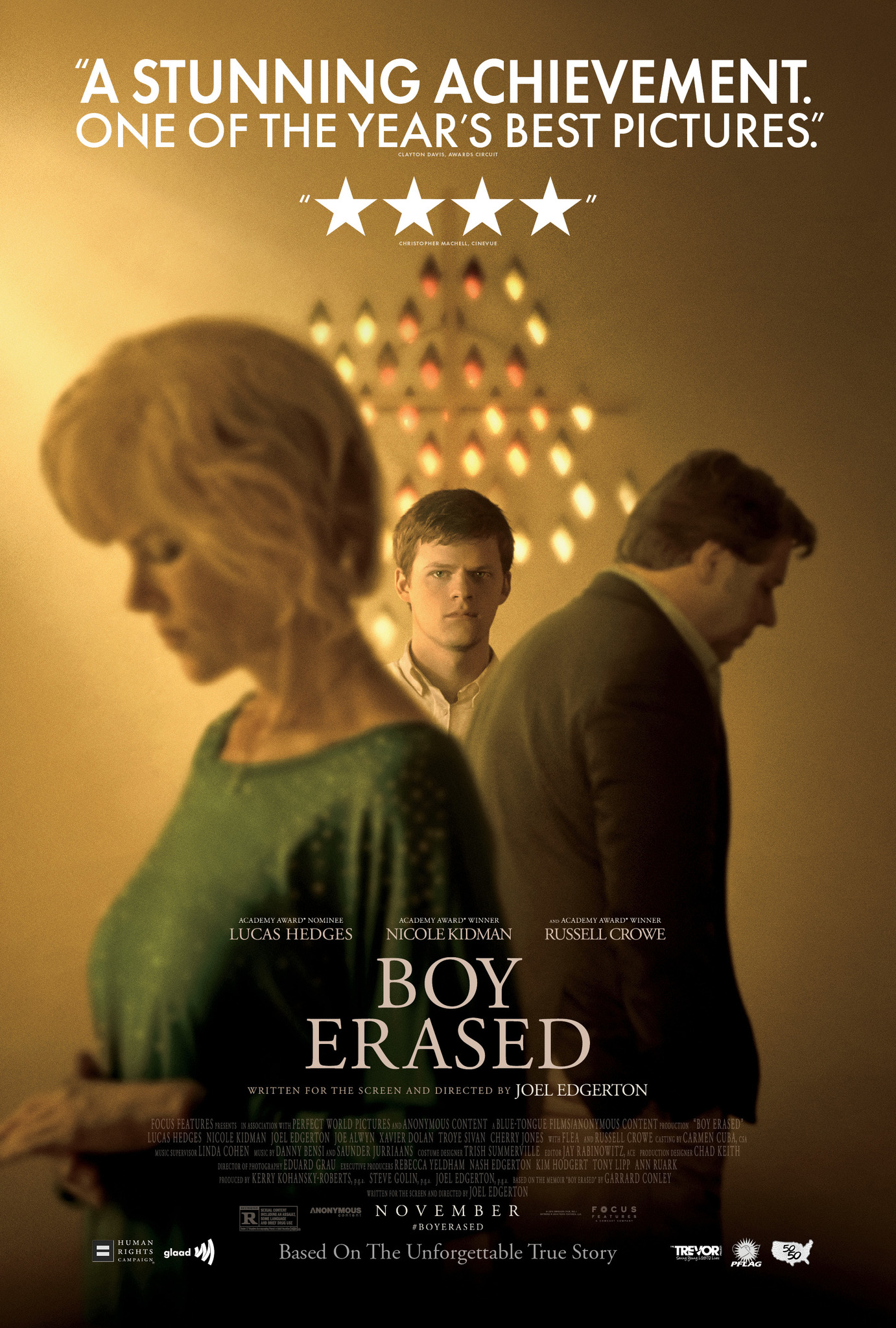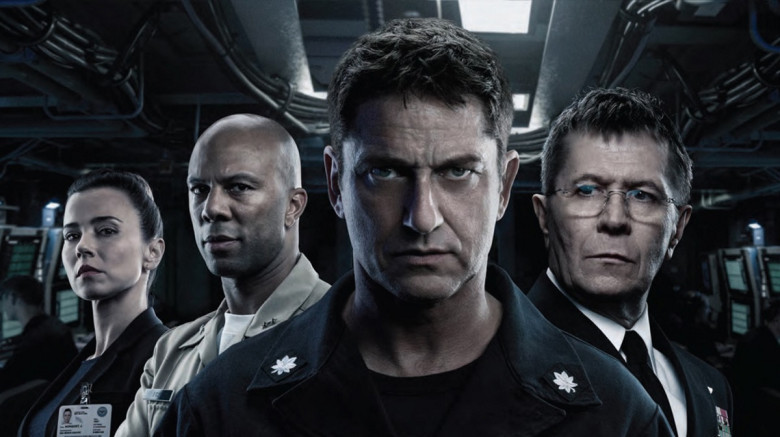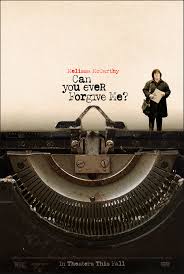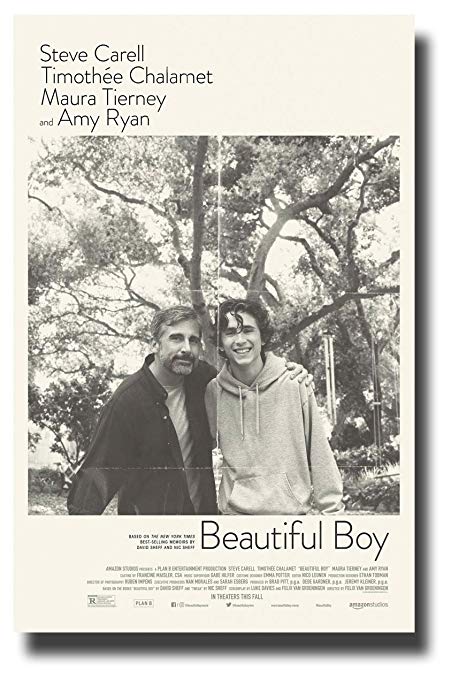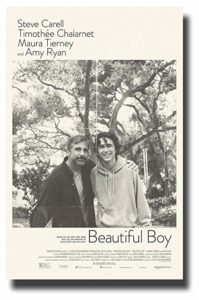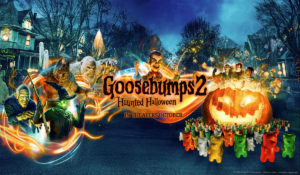Boy Erased
Posted on November 1, 2018 at 5:20 pm
B +| Lowest Recommended Age: | Mature High Schooler |
| MPAA Rating: | Rated R for sexual content including an assault, some language and brief drug use |
| Profanity: | Some strong language |
| Alcohol/ Drugs: | Brief drug use |
| Violence/ Scariness: | Graphic, disturbing rape scene |
| Diversity Issues: | A theme of the movie |
| Date Released to Theaters: | November 2, 2018 |
| Date Released to DVD: | January 28, 2019 |
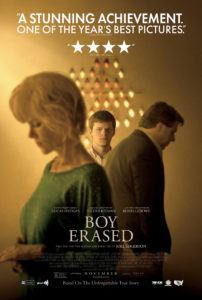
“Boy Erased” is the second major feature film released in 2018 about Christian “gay conversion” facilities (the documentary “Far from the Tree” touched on gay conversion therapy). It is based on the experience of and expose by Garrard Conley, “Boy Erased” might better be called “Boy Ineradicable” because it is the story of a college student who is at first genuinely grateful to be sent to the conversion facility to be “cured,” but there realizes, contrary to and because of that experience, that those who do not understand that he is healthy and love him as he is and for who he is — those are the people in need of conversion.
Home movies show us Jared (as he is called in the film, played by Lucas Hedges) as an only child growing up with devoted and loving parents. His father, Marshall (Russell Crowe) is a preacher and a prosperous owner of a car dealership. He is a sincere and honest man of faith, preaching redemption, not fire and brimstone. Jared’s mother is Nancy (Nicole Kidman), with blonde bouffant hair, perfect manicure, and sparkly sense of style. As Milton wrote in Paradise Lost, “For contemplation he and valour formed,
For softness she and sweet attractive grace; He for God only, she for God in him.”
Jared is a high school basketball player with a pretty cheerleader girlfriend and a brand new car as a birthday gift. But he pushes her away when she tries to get physical, telling her he wants to wait. In college, a handsome student invites him to join him in running and come to his church — and then he rapes Jared. Afterward, he cries, confesses he has done it before, and begs Jared not to tell. And then he pretends to be a counselor, and calls Jared’s parents to tell them that their son has been engaging in homosexual activity.
Jared at first denies it, and does not tell them the truth about the rape. But then he confesses that he does think about men. Marshall consults with senior clergy, and packs Jared off to what begins as a twelve-day live-out program run by a group gruesomely called Love in Action,” run by Victor Sykes (writer/director Joel Edgerton). Sykes tells the young people sent to his facility to make a moral inventory and to list all family members who have sinned, helpfully giving a list of categories to assign, from gang activity to gambling, alcoholism and drug abuse, and homosexuality. “None” is not an acceptable answer.
At first, Jared tries to change. But as he witnesses the abusive tactics, from humiliation to “recommendations” that the participants be switched from live-out, short-term care to live-in care for an indeterminate period, he begins to understand that he is not the one with the problem. Later, we see how his mother and father diverge in their ability to accept him for who he is.
Edgerton’s writing, directing, and performance are all first-rate here. He has said that the issue of imprisonment has scared and fascinated him all his life, and he powerfully creates the sense of claustrophobia and abandonment of the Love in Action facility, and the inept but extremely damaging techniques that exemplify the experiences of almost 700,000 people. His fellow Aussies Crowe and Kidman create real, human portraits, not caricatures. Kidman has two outstanding scenes showing us how Nancy resolves the conflicts between what she has been taught and the love of her son. In his big scene, Crowe shows us a man who is struggling with that conflict. “I sought the counsel of wiser men,” he says, and really, that is what it is all about. How do we decide who is wiser? The information about the main characters at the end provides a powerful coda. Flea is fine in a small role as one of the instructors at the facility, who confesses his own sins and tries to teach the participants how to stand in a manly way.
Hedges continues to impress with his exceptionally thoughtful performances, following his work in “Manchester by the Sea,” “Lady Bird,” and the upcoming “Ben is Back.” He shows us Jared’s vulnerability but also his resilience, and the essential decency that leads him to be true to himself because of his empathy for what the others are going through. This movie should do that for us as well.
Parents should know that this film concerns “gay conversion” with abusive and homophobic activities, a brutal rape scene, sexual references, some strong language, and brief drug use.
Family discussion: Why did Jared’s parents have different ideas about what was best for him? Who are the “wiser” people you consult for advice and why?
If you like this, try: “The Miseducation of Cameron Post” and “But I’m a Cheerleader”

